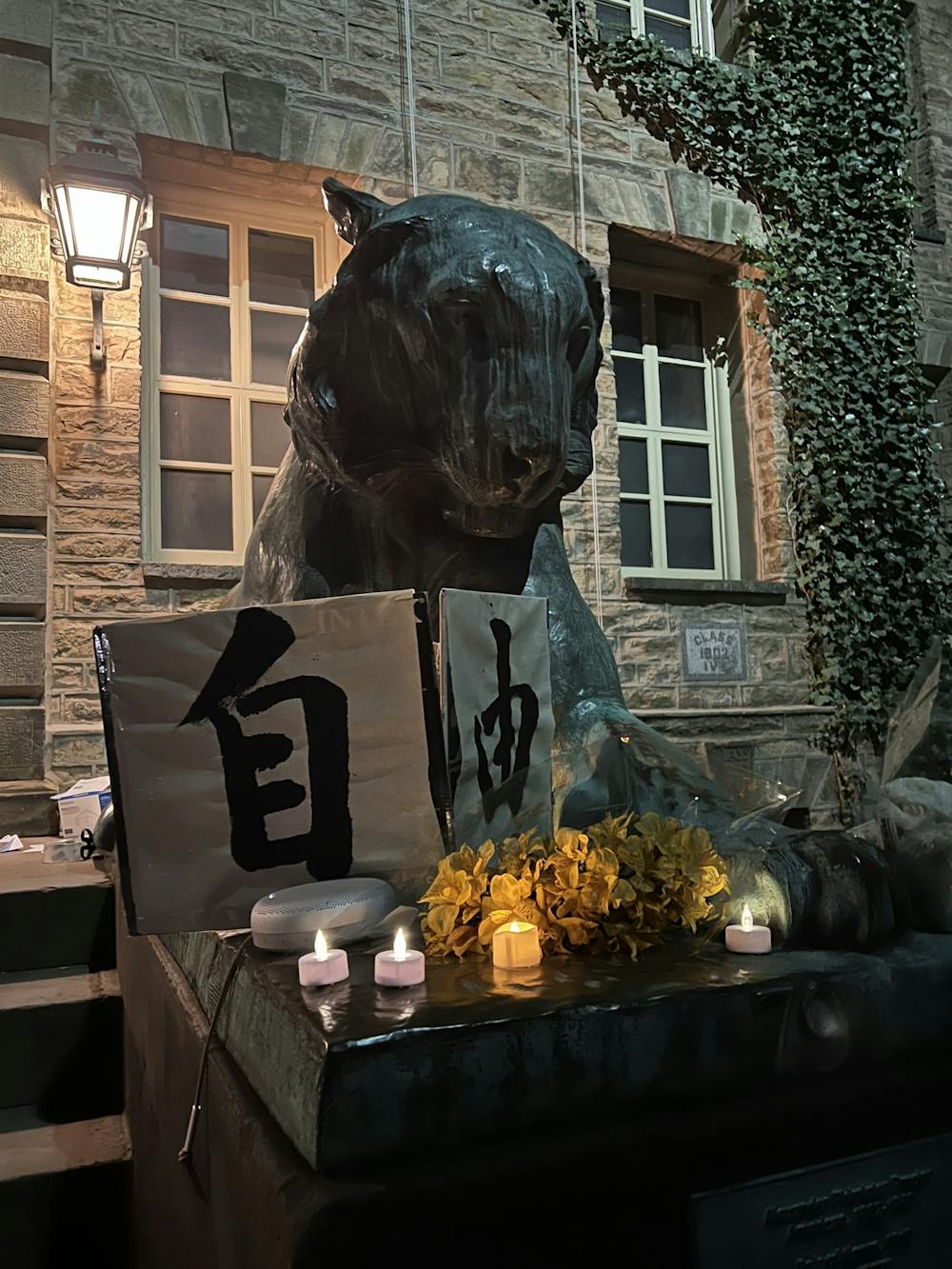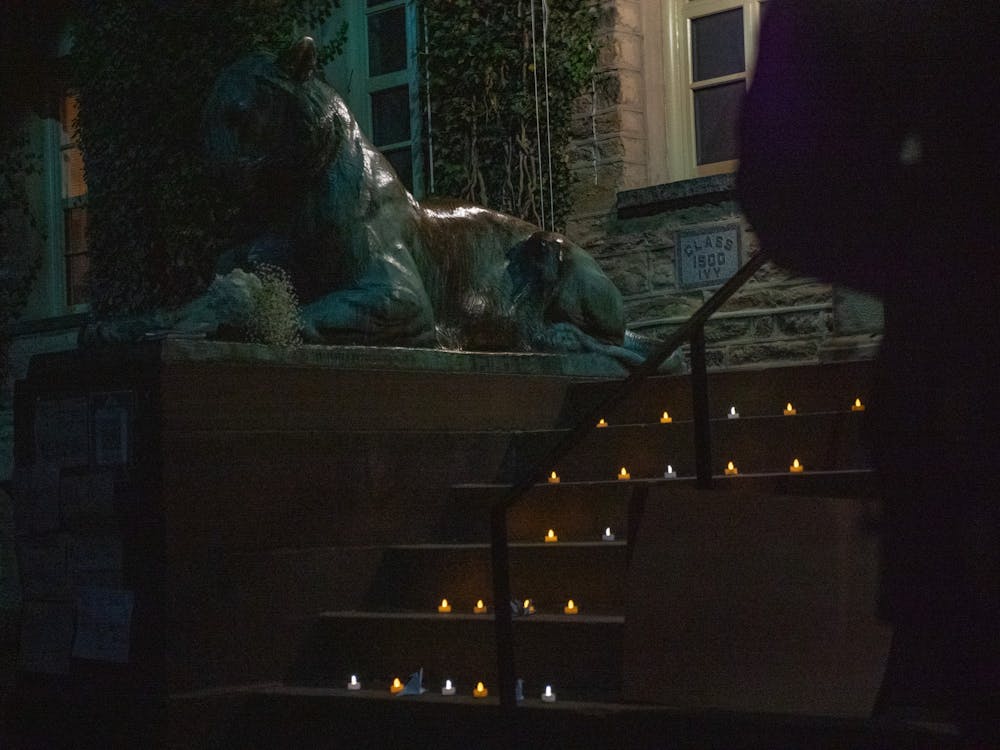Content Warning: This article includes mention of death, suicide, and violence.
On Nov. 24, an apartment building fire killed 10 people in Urumqi, the capital of China’s Xinjiang region. Due to China’s strict zero-COVID policies, the building was partially locked down, which led many to speculate that building exits had been locked from the outside and barriers such as fences and wires trapped residents inside the building and prevented firefighters from rescuing them. The incident has sparked an unprecedented wave of protests across China over the government’s restrictive COVID-19 policy.
In the wake of these protests, student organizers at Princeton led a vigil in remembrance of those who lost their lives, both in the Urumqi fire and in other tragedies related to China’s COVID-19 protocols. The vigil, organized and attended by many Chinese international students, was intended as a show of solidarity with Chinese protesters. Due to fears of retaliation by the Chinese government for their participation, most asked to remain anonymous.
Around 200 people gathered in front of Nassau Hall on Tuesday, Nov. 29, leaving flowers and paper cranes on the steps as symbols of their wishes and prayers. They sang Chinese protest songs like “The People Don’t Need Freedom” and left handwritten signs with slogans such as “Give me liberty or give me death.”
“What happened in Urumqi was not an isolated event, but rather part of a series of tragedies in China in the past two years,” a co-organizer of the event said to the crowd. “On Sept. 18, a bus transporting residents to quarantine camps crashed and killed 27. Later, it was found that the government ran out of bus drivers and let them drive illegally. None of the passengers were even infected.”
The organizer also recounted a story of a woman dying by suicide due to what was reported to be lockdown-induced depression.
“They essentially built prisons that deprived millions of Chinese people of their lives, freedom, and hopes,” they said.
During the vigil, organizers allowed attendees to speak in an “open mic” style. Some students expressed anxiety about the risks of even showing up to the demonstration, but also emphasized their hopes for a free China. For many, this marked the first politically charged event they had ever attended.

“As a Chinese citizen, we all know very well that our lives, our well-being, those we care about, and our entire career can be destroyed in a minute by the regime,” one student said. They attended the event with an “X” taped over their mouth to symbolize opposition to government censorship in China. “But it is our right to be here, our right to discuss this, and everyone should be very proud of themselves for being here tonight.”
“I feel like if I missed this chance [to speak], I would regret it for the rest of my life,” they said.

The Chinese characters for “Freedom” rest on a tiger at Nassau Hall.
Courtesy of event organizers

Teng Biao, a human rights activist and lawyer from China who has been surveilled and arrested multiple times by the Chinese secret police, spoke at the vigil about confronting fears and his experience as an activist.
“I was put under house arrest. I was disbarred and banned from the university where I worked. I was even kidnapped and severely tortured. But I just can’t give up my ideals, my principles,” Biao said. “I really feared, but fear is not something that cannot be overcome.”
He said that all Chinese participants at the event could potentially be recorded by government informants who infiltrate events abroad and have their families targeted or be banned from returning to China.
However, he highlighted the psychological power of the protests.
“Everyone can feel the pain and despair, and that kind of anger and despair can overcome the fear. When people’s fears disappear, the Communist Party rule by fear won’t work,” he said.
Speaking with The Daily Princetonian after the vigil, Biao said he was extremely touched by the high student turnout.
“It’s really rare to see so many Chinese students show up. It’s dangerous and sensitive and may harm their professions and cause their families to be targeted,” he said. “But this kind of turnout is a symbol. People have overcome their fear.”
Another participant who spoke with the ‘Prince’ held a large blank sign, in reference to government censorship. It’s a motif which many protesters in China have recently adopted, known as the white paper revolution. As a student from China, they said they appreciated the opportunity to gather.
“During our educational experience in mainland China, we’re told not to speak up in public. I never took part in these situations before and so I really cherish this experience,” they said.
Many students who spoke called for support and recognition of Chinese protests, from both American citizens and the Chinese community.
“For our English-speaking friends, the best way you could help is to speak to your Chinese friends and learn more about China and how we ended up here,” one student said. “China is more complicated than you might think.”
Another student speaker discussed what they see as the specific duty of Chinese Americans to speak up.
“We have the unique privilege to be citizens of a place where we can speak, read, and write freely, and it is our responsibility to use those rights and freedoms to fight injustice,” they said.
“There are so many brave souls in China risking their careers and the lives of their families and friends,” they continued. “Those of us that don’t have to risk those [things] have the moral obligation to use our rights.”
A student from Beijing said they felt it was important to take a stand.
“It shows our friends in China which side we’re on, especially considering there are Chinese agents everywhere in the free world. It’s important to show them that we’re not afraid and we are here to freely communicate our sentiment against the Chinese government,” they told the ‘Prince.’

Signs and notes written by students collect at the bottom of the steps of Nassau Hall.
Courtesy of event organizers
Biao said that Americans can support Chinese protesters and democracy activists by sharing information, especially through social media.
“If more and more people in the world know what’s happening in China, that puts pressure on Chinese authorities,” he said. He also urged Americans to write to their elected leaders.
“Tell your leaders to be more confrontational to China,” Biao said. “They should prioritize human rights and democratization instead of trade and business.”
Several speakers discussed family members in China and their experiences with the lockdowns. Some spoke about friends who were involved with the protests and their desire to help support the Chinese people marching in the streets.
“I speak for myself and for those who I love in China,” one student said to summarize their purpose.
Others chose to read poems or sing songs to express their love for China and their desire for freedom.
“If I were a bird, I would sing with my hoarse voice of this land buffeted by storms. Why are my eyes brimming with tears? Because I love this land so dearly,” recited one speaker.
Speaking with the ‘Prince’ after the event, the graduate student organizers discussed why they felt called to action in this moment.
“We want to let people know that the Communist Party doesn’t represent the people who suffer a lot from government policies,” said one organizer. “I also want to tell people to show empathy for people who live under authoritarian systems, because it may take a long time for them to find their voices.”
“I’m very moved by people speaking from their personal experiences and being very frank about the risk that they took in participating today,” said another organizer.
They said they hope that more U.S. citizens will become engaged in supporting the Chinese people in these protests, and said they would continue to build solidarity among the Chinese international community in Princeton.
The vigil was held at 6 p.m. on Tuesday, Nov. 29 in front of Nassau Hall.
Michelle Miao is a news and newsletter contributor for the ‘Prince.’
Please direct any corrections to corrections[at]dailyprincetonian.com.








